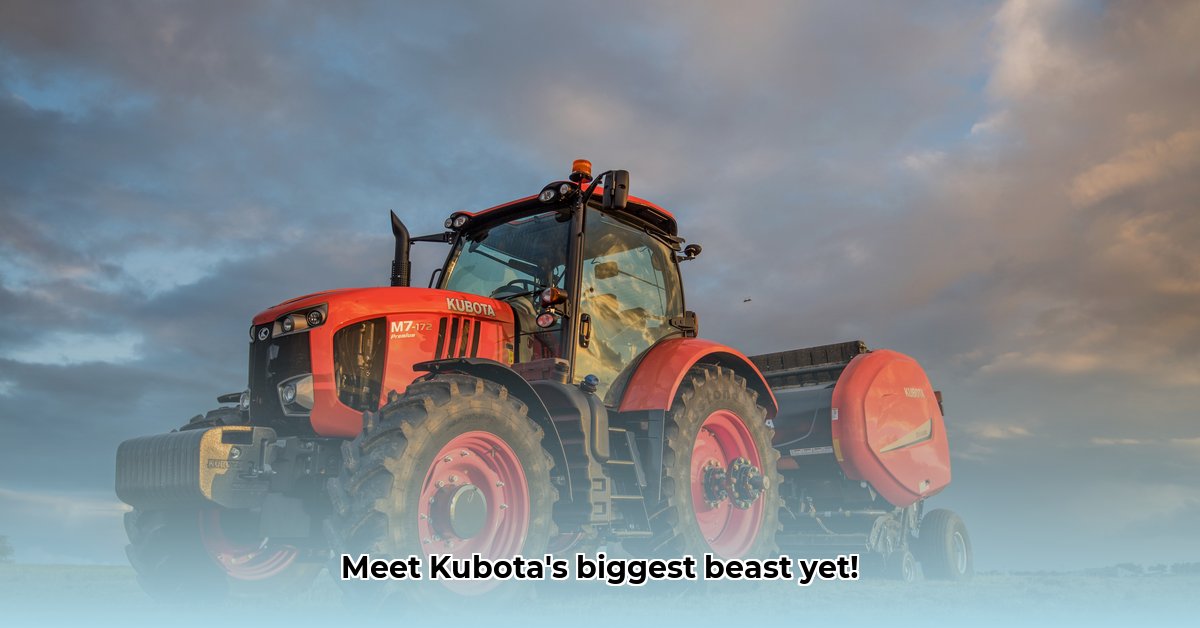
The Kubota M8 series, Kubota's largest tractor to date, is revolutionizing large-scale farming. This powerhouse boasts impressive capabilities, promising increased efficiency and potential contributions to sustainable agriculture. However, its impact is complex, demanding a balanced assessment of its benefits and drawbacks. This in-depth analysis explores the M8's features, performance, sustainability implications, and the perspectives of various stakeholders. For comparison, see details on the smaller Kubota L3901.
Power Meets Precision: Understanding the M8's Capabilities
The Kubota M8 is a significant departure from traditional tractors. With over 200 horsepower (exact figures vary by model) and an advanced transmission system, it delivers power smoothly and efficiently to the wheels. Its ergonomic cab, designed for operator comfort, minimizes fatigue during extended use. Intuitive controls further enhance operational efficiency. But beyond its power, its environmental impact is a critical consideration.
Here's a breakdown of key features and their potential impacts:
| Feature | Description | Potential Impact on Farm Efficiency | Potential Downsides |
|---|---|---|---|
| High Horsepower (200+ HP) | Handles demanding tasks like plowing large fields and heavy haulage with ease. | Significantly faster fieldwork, increased acreage coverage per day. | Increased potential fuel consumption (requires further detailed investigation). |
| Advanced Transmission | Smooth power delivery across various tasks, from tilling to harvesting. | Reduced potential fuel consumption (requires further investigation). | Complex system may require specialized maintenance. |
| Ergonomic Cab Design | Comfortable, spacious, and safe cab designed to minimize operator fatigue. | Increased productivity due to reduced operator tiredness and stress. | High initial cost contributes to overall higher price point. |
| Precision Farming Tech | Potential for GPS integration and auto-steering capabilities for optimized resource use. | Optimized resource usage (fertilizers, pesticides, water, seeds), reduced waste. | Requires additional operator training and investment in supporting technology. |
Efficiency and Sustainability: A Critical Evaluation
The M8 promises increased efficiency: fewer passes over fields, faster harvesting, and significant time savings. However, larger machinery often equates to higher fuel consumption. Therefore, the M8's true environmental footprint remains uncertain, necessitating thorough research into its fuel efficiency and greenhouse gas emissions. A crucial aspect is striking the right balance between productivity gains and environmentally sound agricultural practices. Can the enhanced efficiency truly offset increased fuel usage? More data is needed to answer this crucial question conclusively.
Sustainability: Weighing the Pros and Cons
The M8 presents a complex sustainability equation. On the positive side, it can substantially reduce labor requirements on large farms, potentially boosting profitability. However, this efficiency may displace farmworkers, raising concerns about job displacement. Furthermore, the increased efficiency of the M8 may contribute to land consolidation, potentially reducing farm diversity and making our food systems more vulnerable. These are significant questions requiring careful consideration.
Stakeholder Perspectives: Diverse Impacts
Large-scale farms are likely to be early adopters of the M8, driven by the promise of productivity and cost reduction. However, the high initial investment cost may pose a serious barrier for smaller farms, potentially exacerbating existing inequalities in the agricultural sector. Policymakers must carefully consider these implications, ensuring support for sustainable farming practices benefits all farm sizes. Kubota, too, faces the challenge of mitigating the potential negative environmental and social impacts of its powerful technology. Continued research and development into alternative and renewable fuels is not only essential for Kubota's long-term success but crucial for the future of sustainable agriculture.
The Path Forward: Research and Responsible Innovation
The Kubota M8 signifies a significant advancement in agricultural technology. But its long-term sustainability impact demands further investigation. We need independent studies on fuel efficiency, emissions, and the socioeconomic consequences of increased farm mechanization. The responsible use of the M8 hinges on careful consideration of its complete impact—positive and negative. Continued research, open discussion, and a commitment to responsible innovation are vital to ensuring that this technological shift benefits society as a whole, without compromising the long-term sustainability of our agricultural systems and the planet's health. The crucial question remains: Can the increased efficiency outweigh the potential environmental and social costs? Only rigorous investigation will provide a definitive answer.